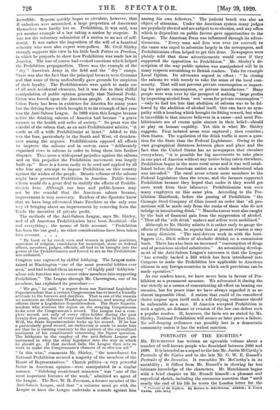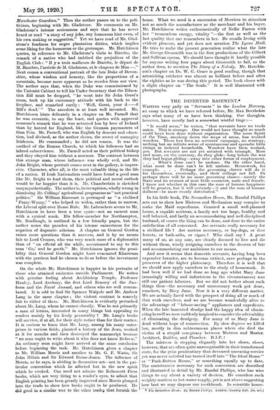PORTRAITS OF THE EIGHTIES.•
Ma. Hurrennrsow has written an agreeable volume about a number of well-known people who flourished between 1880 and 1890. It is intended as a sequel to the late Mr. Justin McCarthy's Portraits of the Sixties and to the late Mr. G. W. E. Russell's Portraits of the Seventies. It resembles Mr. McCarthy's in its amiability ; it differs from Mr. Russell's in showing far less intimate knowledge of the characters. Mr. Hutchinson begins with a brief chapter on Mr. Russell himself—a pleasant and superficial sketch, including the erroneous assertion that " until nearly the end of his life he wrote the London letter for the • Portraits of the Eighties. By Horace G. Hutchinson. Loud= T. Fisher 1.7awin. 11Be. act.] Manchester Guardian." Then the author passes on to the poli- ticians, beginning with Mr. Gladstone. He comments on Mr. Gladstone's intense seriousness and says that he has never heard or read " a story of any joke, any humorous hint even, of his own making or suggestion." Yet we have read of Mr. Glad- stone's fondness for negro plantation ditties, which implies some liking for the humorous or the grotesque. Mr. Hutchinson quotes, in reference to Mr. Gladstone's visits to Biarritz, the remark of a native who had imbibed the prejudices of the English Club : " II y a trois malheurs de Biarritz, le depart de M. Hambro, Parrivee de M. Gladstone, et le chapeau de Miss —." Next comes a conventional portrait of the late Duke of Devon- shire, whose wisdom and honesty, like the proportions of a mountain, become more apparent as he recedes from our view. The author says that, when the Duke was commissioned by the Unionist Cabinet to tell his Under Secretary that the Educa- tion Bill must be dropped, " he went into Sir John Gorses room, took up his customary attitude with his back to the fireplace, and remarked curtly : Well, Gorst, your d—d Bill's dead.' " The anecdote is at least well invented. Mr. Hutchinson hints delicately in a chapter on Mr. Parnell that he was eccentric, to say the least, and quotes with approval someone's remark that he was actuated less by love of Ireland than by hatred for England, like the German paymasters of Sinn Fein. Mr. Parnell, who was English by descent and educa- tion, had divined, as the author shows, the secret of managing Irishmen. He commanded ; he did not reason. It was the method of the Roman Church, to which his followers had an inbred subservience. Mr. Parnell acted as their political bishop and they obeyed him without a murmur. The contrast between this strange man, whose influence was wholly evil, and Mr. John Bright, whose portrait comes next in the gallery, is impres- sive. Character, after all, is the most valuable thing in the life of a nation. If Irish Nationalists could have found a good man like Mr. Bright to lead them, their political and moral outlook would be far happier than it is. Mr. Chamberlain is sketched unsympathetically. The author is, in our opinion, wholly wrong in dismissing Mr. Collings' agricultural programme as" not practical politics." Sir William Harcourt is portrayed as " a civilised ' Fuzzy-Wuzzy,' " who helped to widen, rather than to narrow, the Liberal split over Home Rule. Mr. Labouchere seems to Ma Hutchinson to have been a true cynic—not an earnest man with a cynical mask. His fellow-member for Northampton, Mr. Bradlaugh, is outlined in a few friendly pages, but the author notes the paradox of his intense earnestness for the negation of dogmatic atheism. A chapter on General Gordon raises more questions than it answers, and is by no means fair to Lord Cromer, who was very much more of a diplomatist than of " an official all the while, accustomed to say to this man ' Go,' and he goeth." Mr. Hutchinson ignores the possi- bility that General Gordon might have evacuated Khartoum with 'the garrison had he chosen to do so before the investment was complete.
On the whole Mr. Hutchinson is happier in his portraits of those who attained eminence outside Parliament, He writes with genuine feeling about Archbishop Temple, Professor Huxley, Lord Avebury, the first Lord Brassey of the Sun- beam and the Naval Annual, and others who are well remem- bered. It is odd to find Sir Spencer Walpole and Mr. Andrew Lang in the same chapter ; the violent contrast is scarcely fair to either of them. Mr. Hutchinson is evidently perturbed about Mr. Lang, whom he cannot classify. Was he not primarily a man of letters, interested in many things but appealing to readers mainly by his lively personality ? Mr. Lang's books will survive, if at all, for their style rather than for their matter. It is curious to learn that Mr. Lang, among his many enter- "irises in various fields, planned a history of the Jews, worked at it for months and then destroyed the manuscript because " no man ought to write about it who does not know Hebrew." An ordinary man might have arrived at the same conclusion before beginning the task. Mr. Hutchinson gives a chapter to Mr. William Morris and another to Mr. G. F. Watts, Sir John Millais and Sir Edward Burne-Jones. The influence of Morris, as he says, is abiding in decorative art—not in the par- ticular convention which he affected but in the new spirit which he evoked. One need not admire the Kelmscott Press books, which are very tiring to a reader's eyes, to admit that English printing has been greatly improved since Morris plunged into the trade to show how books ought to be produced. He did good in a similar way to the other trades that furnish the home. What we need is a succession of Morrises to stimulate not so much the manufacturer as the merchant and his buyer. Mr. Hutchinson writes enthusiastically of Nellie Farren with her " tremendous energy, vitality "—the first as well as the last quality that one remembers in her. He recalls Irving with evident pleasure, and yet does not mention The Lyons Mail. He tries to make the present generation realize what the late Mr. George Grossmith was in the first productions of the Gilbert and Sullivan operas. We should have thought it hardly possible for anyone writing four pages about Grossmith to fail, as the author does, to mention The Diary of a Nobody. Mr. Hutchin- son's chapter on Dr. W. G. Grace is good reading, though that astonishing cricketer was almost as brilliant before and after the eighties as he was during this period. The book closes with a slight chapter on " The Souls." It is well illustrated with photographs.







































 Previous page
Previous page